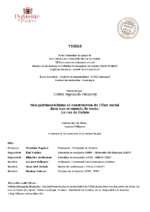Ngouanda Mickelley Silvère
Néo-patrimonialisme et construction de l'État social dans une économie de rente. Le cas du Gabon
frDépôt légal électroniqueConsulter le texte intégral de la thèse (format PDF)

Résumé
Français
Néo-patrimonialisme et construction de l'État social dans une économie de rente. Le cas du Gabon
Cette thèse s'inscrit dans le courant de la sociologie politique africaniste et permet de questionner à nouveaux frais la place de l'État en Afrique, son historicité et sa force actuelle. Tout en documentant à partir d'un nouveau cas la question désormais balisée du clientélisme et de ce que l'on appelle « la politique du ventre », elle permet par ailleurs d'avancer sur une question très peu travaillée, celle de « l'État social en Afrique ». Avec le développement de l'économie de rente, le Gabon a fait de la construction de la protection sociale, un moyen de redistribution de la richesse nationale. Cependant, le profil social du pays, marqué par une paupérisation progressive des couches démunies, éclaire sur les insuffisances de cette ambition. Comprendre et analyser les insuffisances de la construction de l'État social constitue la problématique centrale de cette recherche. Ainsi, cette sociologie politique de l'État social au Gabon montre que l'enracinement du clientélisme assistantiel (aide sociale personnalisée prodiguée par l'élite gouvernante aux couches défavorisées) constitue un frein à l'institutionnalisation de la solidarité nationale. Même si l'avènement au pouvoir d'Ali Bongo Ondimba s'est accompagné d'un frémissement du « social » (promotion de la CNAMGS et du FNAS), la protection sociale des couches défavorisées demeure un défi majeur.
Mots-clés libres : Clientélisme, économie de rente, élite gouvernante, néo-patrimonialisme, protection sociale.
- Rente -- Aspect économique -- Gabon
- Clientélisme -- Aspect économique -- Gabon
English
Neo-patrimonialism and the construction of the social state in a cash economy. The case of Gabon
This thesis is conducted in the frame of an african political sociology and allows to reconsider the role of the state in Africa, its historicity and its current strength. While documenting from a new case study the issue clientelism which has already marked out and what is labelled as the "politics of the belly", it also constitutes an important input for advancing the discussion of this poorly researched issue, that of "the social state in Africa". With the development of the annuity economy, the governing power had the vision of setting up a social protection policy which focused mainly on the disadvantaged in the framework of the better redistribution of national wealth. However, the social profile of the country, marked by progressive impoverishment of the poor segment of the society, illuminates the shortcomings of the government policy of solidarity. Understanding and analyzing the shortcomings of the social state's construction is the central issue of the current research. Thus, the political sociology of the welfare state in Gabon shows that the permanent use of "palliative measures" as a means of popular consent hampers the institutionalization of the national solidarity program. Although Ali Bongo Ondimba's accession to power has shown some signs of recovery (promoting the CNAMGS and ANSF), the social protection of the most disadvantaged segments of society still remains a major challenge.
Keywords : Clientelism, windfall economy, governing elite, neopatrimonialism, social protection.
Notice
- Diplôme :
- Doctorat d'Université
- Établissement de soutenance :
- Université de Poitiers
- UFR, institut ou école :
- UFR de sciences humaines et arts (SHA)
- Laboratoire :
- Groupe de Recherche et d’Etudes Sociologique du Centre Ouest (Poitiers)
- Domaine de recherche :
- Sociologie
- Directeur(s) de thèse :
- Laurent Willemez
- Date de soutenance :
- 22 novembre 2016
- Président du jury :
- Christian Papinot
- Rapporteurs :
- Éric Verdier, Blandine Destremau
- Membres du jury :
- Laurent Willemez, Marc Mvé Bekale, Myriam Catusse
Menu :
-
-
À propos d'UPthèses
-
Voir aussi
Annexe :
-
Une question ?
Avec le service Ubib.fr, posez votre question par chat à un bibliothécaire dans la fenêtre ci-dessous :
ou par messagerie électronique 7j/7 - 24h/24h, une réponse vous sera adressée sous 48h.
Accédez au formulaire...
Université de Poitiers - 15, rue de l'Hôtel Dieu - 86034 POITIERS Cedex - France - Tél : (33) (0)5 49 45 30 00 - Fax : (33) (0)5 49 45 30 50
these@support.univ-poitiers.fr -
Crédits et mentions légales
